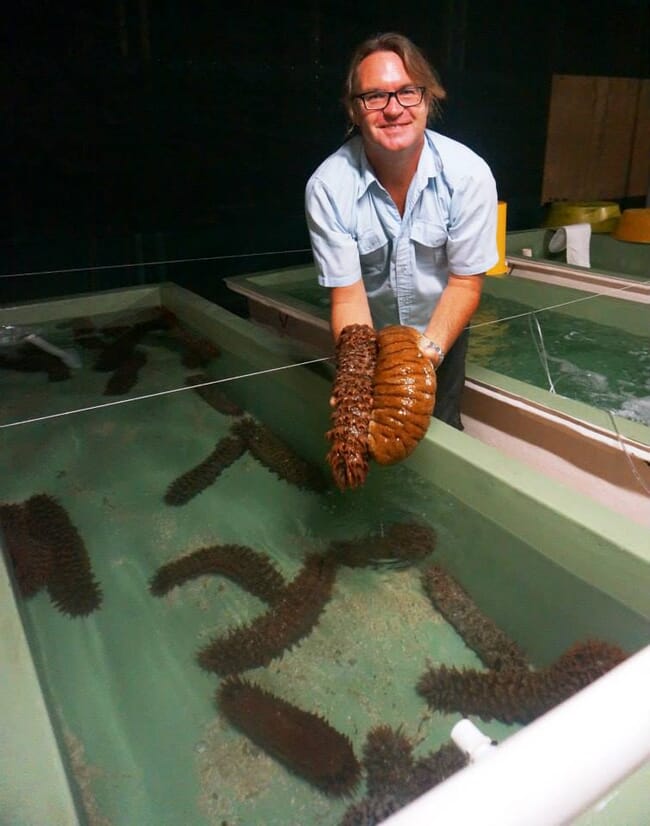
Paul Christian Ryan at Pacific Ocean Culture's sea cucumber hatchery © Pacific Ocean Culture
CEO Paul Christian Ryan spoke to The Fish Site about the current operation and about his plans for the future.
How did it all begin?
“I had spent many years working in various African countries, before establishing Vate Ocean Gardens on Vanuatu, which became the largest tilapia producing company in the South Pacific. In 2012, I made the move to Fiji, aiming to use my expertise to expand commercial aquaculture across the Pacific. I set up Pacific Ocean Culture, with a view to farming a number of different marine and freshwater species,” Ryan recalls.
The early years saw the company’s research and development (R&D) in marine hatchery operations focused upon endemic species to Fiji, and Ryan was delighted to gain recognition as a finalist in the FISH 2.0 2015 Sustainable Seafood Competition, for the proposed development of IMTA in Fiji involving seaweeds, sea cucumbers and bivalves, to benefit coastal communities.
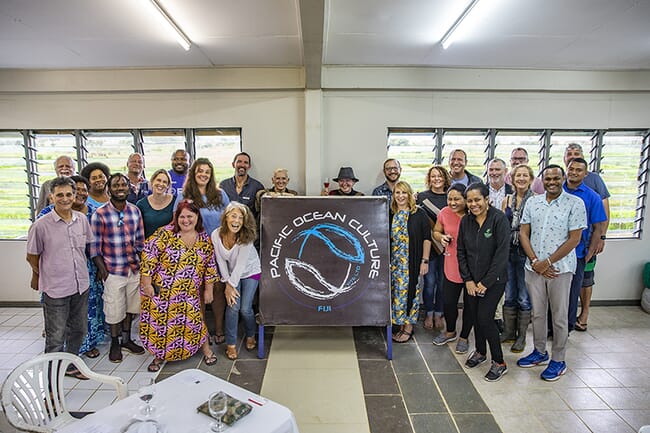
Ryan and his colleagues have expanded an academic demonstration farm into a 16-hectare aquaculture facility © Pacific Ocean Culture
“When the Fiji National University academic facility became available in 2016, we decided to make the move into freshwater production. The opportunity to transform the facility into the most prominent commercial operation in the Pacific was significant for the company, and also for the profile of aquaculture in Fiji. There was finally a viable solution to the island’s food security needs,” he says.
The new farm had 8 hectares of ponds, which allowed variable production to match the needs of the academic purpose it supported. Ryan and his team have since doubled the size of the production facility to 16 hectares and have an output goal of 300 tonnes of fish and prawns per annum.
“The Ministry of Fisheries, Fiji, has in its Strategic Plan 2019-2029, an aquaculture production target of 1,000 tonnes of tilapia per year to meet food security needs by 2029. Our objective is to expand the freshwater farm to give us the potential to satisfy the fish-based protein need by 2025, ahead of the government’s goal. This in turn will reduce pressure on the local marine resource and enable the stocks to start regenerating,” Ryan says.
He explains that building a recognised food-safe processing facility had also been an important step, enabling all product to reach the consumer in prime condition. It has also been a key factor in helping to create a high quality, Fiji-grown brand for the country, which is important both for local sales and for developing export potential.
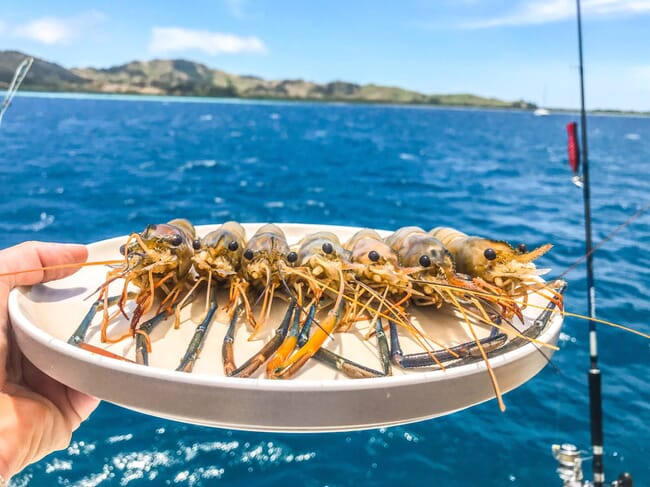
Pacific Ocean Culture has helped establish a Fiji-grown brand for its produce © Pacific Ocean Culture
What are your production techniques?
“The area we live in has abundant rainfall, which feeds the reservoir and ponds and gives us fertile and nutrient-dense water to grow our premium aquaculture products in. This sits well with our company ethos, which centres on sustainability, low impact farming methods and zero percent waste.
“From this starting point, we control every aspect of the pond-to-plate journey, from our in-house hatchery, through the production and harvesting cycle, to the processing facility where we pack and sell,” Ryan says.
The multi-species hatchery and broodstock maturation facilities are designed to offer flexible options, and Ryan has overseen the establishment of a superior genetic pool of broodstock, to ensure a consistent seed supply.
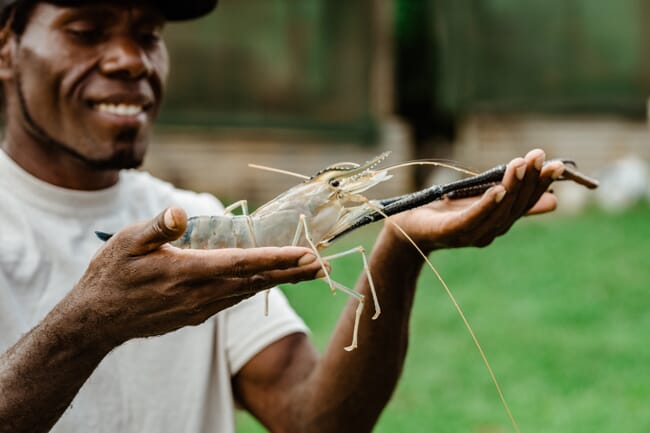
The freshwater farm site currently specialises in production of giant freshwater prawns © Pacific Ocean Culture
“Pacific Ocean Culture’s proven breeding success in the hatchery and the expansion in production, based on multi-trophic ecosystems in the ponds, has transformed aquaculture in Fiji,” he reflects.
What do you farm and where are the markets?
The freshwater farm site currently specialises in production of giant freshwater prawns, (Macrobrachium rosenbergii), genetically improved farmed tilapia (GIFT) and red hybrid tilapia (Oreochromis sp).
“We have built up a domestic market focused on these species, and plan to explore export opportunities, particularly as we diversify our aquaculture products and add value. Our current goals include expanding our mariculture footprint and focusing on endemic species in support of the regional Aquaculture Strategy for the Pacific,” Ryan explains.
The company also helps community farmers by supplying fingerlings for village grow-out projects, to support local food security.
“In 2019, we won the Primary Industry Business Excellence Award, in the Prime Minister’s International Business Awards, which was a proud moment and recognition of what we had achieved so far,” Ryan notes.
What benefits have the company brought to the local community and Fiji?
Pacific Ocean Culture actively implements a range of strategies for social responsibility. The company made a voluntary commitment to United Nations Sustainable Development Goal (SDG) 14, Life Below Water, and actively promotes operational activities to support this pledge. It also supports SDG 13 Climate Action, SDG 5 Gender Equality, and SDG 8 Decent Work and Economic Growth.
“We are actively involved in this business to help make a difference to the planet and the health of its oceans,” Ryan says.
He adds that the company provides nutritious, affordable, healthy food options that help to reduce the incidence of chronic non-communicable diseases (NCDs) in Fiji. NCDs are linked to risks such as eating unhealthy diets and are the number one cause of death and disability in the world.
“Navua, where we are based, is an impoverished rural community, and we offer local workers the opportunity for regular income and capability development. By actively recruiting staff from nearby villages, we are able to enhance the impact of our business in the rural area and bring cash flow and economic empowerment into the community,” he observes.
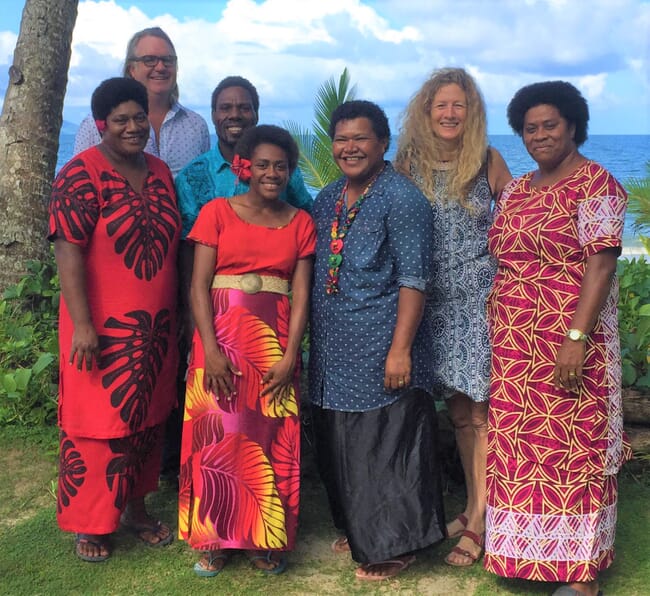
Pacific Ocean Culture hires and trains local workers and women make up 80 percent of their payroll © Pacific Ocean Culture
Are women important to your business?
Pacific Ocean Culture is a signatory to the United Nations’ Women’s Empowerment Principles, and women are a vital component of the company’s workforce, making up 80 percent of the payroll. The company actively champions women in aquaculture, enables and empowers marginalised community members, and promotes equality. Ryan is proud to "walk the talk".
During the Covid-19 pandemic, Pacific Ocean Culture stepped up its commitment to rural development and empowerment of women and youth, and focused training opportunities for staff upon a multi-role approach. A memorandum of understand (MOU) with the local university has helped to enhance opportunities for students to develop their hatchery skills and capability.
“Hiring from the rural area has created a sense of family at the fish farm, and the multi-tasking roles facilitate skills development in all aspects of the value chain in the business. We are proud of the team and thankful for the flexibility, good humour and dedication they bring to the workplace,” he says.
What are your main challenges?
Developing aquaculture in Fiji from its traditional community-based roots to become a fully-fledged commercial sector, has brought the need to develop rigorous standards to enable Pacific Ocean Culture to compete with international competitors and imports.
“We see our role as a pioneer in the sector as tantamount to the sustainability of the business, and our practices have set the benchmark for others to follow. We have contributed to the development of formal protocols for aquaculture, and network with key stakeholders to overcome the many challenges we continue to face. Our future industry relies very much on integrity and sound business practice,” Ryan said.
Key challenges have included sourcing cost-effective feed, for which a local supply solution was established, developing consumer awareness of the importance of aquaculture products in the diet, and persuading people of the value of seeking out the Fiji Born, Bred and Fed label. Highlighting to students that the future of the industry is dependent on a skilled local workforce. and encouraging them to take up internships and placements on the farm, has also been a challenge.
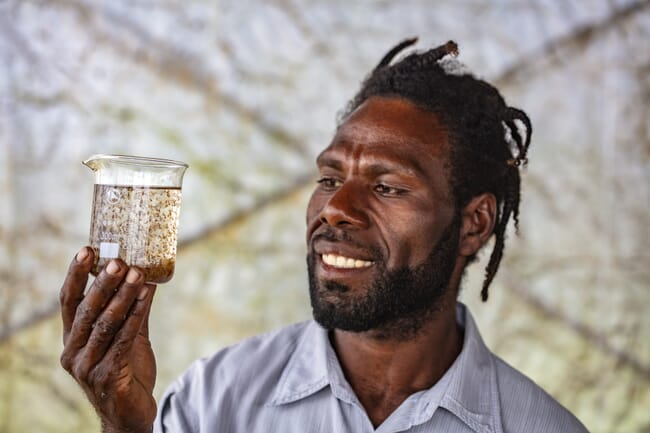
Pacific Ocean Culture has worked to establish formal protocols for aquaculture in Fiji © Pacific Ocean Culture
What innovations have made a difference to your business?
The Pacific traditionally has relied upon imported equipment, but with manufacturing skills available locally, Pacific Ocean Culture set about developing an in-house production unit to manufacture aquaculture netting.
“We have undertaken a successful pilot scheme to manufacture and trial nets. Our in-house staff are currently producing these to our design, and we are trialling them for quality and longevity,” Ryan says.
Benefits to the company and the community include an increase in skills, more employment opportunities, reduced costs for small scale farmers, flexibility in design, and the ability to make and trial different configurations quickly.
Work is also underway on a collaboration between Pacific Ocean Culture and Growa Fish Ltd, a newly established aquaculture company on the island.
“This has involved the conditioning and selection of prime broodstock from our genetically superior strain of giant prawns, which will be loaned to Growa Fish, for use in their own hatchery. The goal is to see the post-larvae (PLs) complete the production phase, with grow-out undertaken by both businesses, through to harvest and onto the plate,” he says.
Collaborations are seen as key to developing the aquaculture sector in Fiji, with shared resources and goals increasing the availability of Fiji Grown products for the consumer to eat.
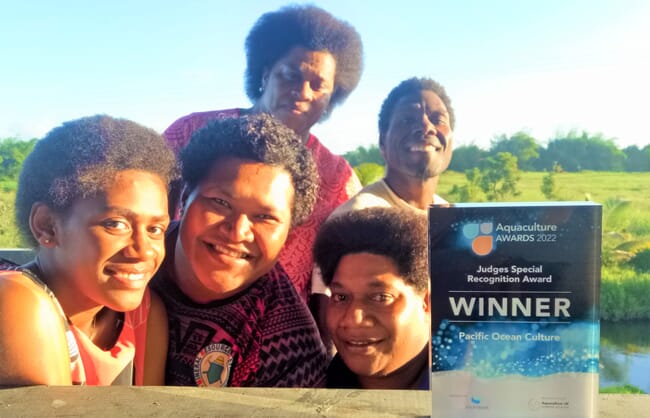
What plans do you have for the future?
“We are proud and motivated by the company’s recent win at the UK Aquaculture Awards [where they won a special recognition prize] and see this as global recognition that we are moving in the right direction. Pacific Ocean Culture has always been forward-thinking, and we strive to meet the seafood needs of Fiji, the wider Pacific and beyond. Our goal is always to reduce imports and improve the sustainability of our blue resources,” Ryan explains.
Diversification of species and environments is the next step, to create further positive impacts for rural, coastal and maritime communities. Plans include diversification and expansion of production, developing value-added product lines and building export capacity.
“One exciting development is the dialogue that is underway with global sector leaders, with the aim of partnering up to improve and implement greater infrastructure to support research, undertake more pilot-scale production trials, and fast-track commercial rollout of new species. There are exciting times ahead,” Ryan concludes.




